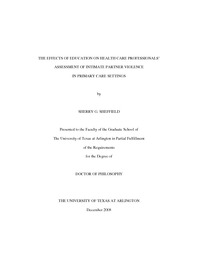
ATTENTION: The works hosted here are being migrated to a new repository that will consolidate resources, improve discoverability, and better show UTA's research impact on the global community. We will update authors as the migration progresses. Please see MavMatrix for more information.
Show simple item record
| dc.contributor.author | Sheffield, Sherry G. | en_US |
| dc.date.accessioned | 2009-09-16T18:20:03Z | |
| dc.date.available | 2009-09-16T18:20:03Z | |
| dc.date.issued | 2009-09-16T18:20:03Z | |
| dc.date.submitted | January 2008 | en_US |
| dc.identifier.other | DISS-10069 | en_US |
| dc.identifier.uri | http://hdl.handle.net/10106/1815 | |
| dc.description.abstract | This study was designed to explore what factors influence healthcare professionals' assessment of intimate partner violence (IPV) and to examine the effects of education on healthcare professionals' IPV knowledge, opinions, and assessment behaviors. A quasi-experimental, pretest-post-test non-equivalent comparison group design was utilized to collect data. One hundred forty-nine (N = 149) healthcare professionals from three outpatient healthcare settings participated in this study. Participants completed a survey questionnaire (PREMIS) designed to measure healthcare professionals' IPV knowledge, opinions, and practices, and to assess training effectiveness. Participants' responses on PREMIS scales were evaluated to determine the relationship between sample demographics, previous training, knowledge, and opinions with IPV assessment in practice. Responses on IPV knowledge scales, opinion subscales, and practice scales were also evaluated to assess the effectiveness of an education intervention.Study findings revealed that 32% of the study sample had no previous IPV training and 60% of those who had training reported two or less hours. Knowledge scores were significantly lower than a normed data set at pretest for the experimental group, however, post-test knowledge scores improved significantly (p = .00) following participation in the education intervention and effect size analysis revealed that 41% of the variability in knowledge scores was explained by membership in the experimental group. The experimental group's knowledge scores and opinion subscale scores were also significantly improved when compared to the comparison/control groups. Bivariate and multivariate analysis was utilized to explore what factors influence assessment behaviors in practice. Findings suggest that self-efficacy was the strongest predictor of variability in practice issues for participants in this study. | en_US |
| dc.description.sponsorship | Spence-Almaguer, Emily | en_US |
| dc.language.iso | EN | en_US |
| dc.publisher | Social Work | en_US |
| dc.title | The Effects Of Education On Health Care Professionals' Assessment Of Intimate Partner Violence In Primary Care Settings | en_US |
| dc.type | Ph.D. | en_US |
| dc.contributor.committeeChair | Spence-Almaguer, Emily | en_US |
| dc.degree.department | Social Work | en_US |
| dc.degree.discipline | Social Work | en_US |
| dc.degree.grantor | University of Texas at Arlington | en_US |
| dc.degree.level | doctoral | en_US |
| dc.degree.name | Ph.D. | en_US |
| dc.identifier.externalLink | http://www.uta.edu/ra/real/editprofile.php?onlyview=1&pid=626 | |
| dc.identifier.externalLinkDescription | Link to Research Profiles | |
Files in this item
- Name:
- Sheffield_uta_2502D_10069.pdf
- Size:
- 446.6Kb
- Format:
- PDF
This item appears in the following Collection(s)
Show simple item record


